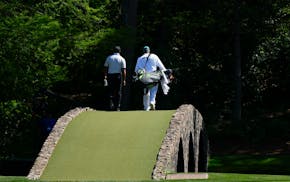Of all the fiery rings of imaginable hell, none could possibly sear the soul like the loss of a child.
Adrian Peterson's son died this week. This is the worst loss a human can suffer, and it happened in the worst possible way. A man allegedly beat his 2-year-old son to death.
When he was 7, Peterson watched his older brother get hit by a drunken driver and die.
While he attended the NFL combine, he learned of a half-brother being shot and killed.
Now, he has lost a son. He will grieve, and it appears he will play football while grieving.
How do athletes do this? How do they summon the competitiveness to play a game while bearing a heavy heart and a cluttered mind?
How will Adrian Peterson?
To the layman, the concept of playing a game while grieving makes little sense. No one would want to go to the office on the day their son died.
Great athletes are different from us in many ways, and this is one of those ways.
Games are their milieu. As hoary as the cliché has become, teams are their temporary families. The playing field is where they pour out their emotions, where they honor those they love.
If Peterson decides to play on Sunday, he will not be demonstrating insensitivity to his personal tragedy. He will not be displaying misguided priorities, or placing football above real life. There is no correct choice for Peterson to make, only the choice that allows him to grieve as he sees fit.
If he decides to play, he will be honoring his son the best way he knows how.
History overflows with athletes who perform, and perform well, while emotionally stricken. Perhaps the best example of this was provided by one of the most emotional players of his generation, Brett Favre.
On Dec. 21, 2003, Favre told his teammates in a meeting that his father had died and that he planned to play the next night, against the Oakland Raiders on Monday Night Football.
He threw for 311 yards and four touchdowns in the first half, and the Packers won in a rout. Favre played brilliantly at times, and at times his receivers seemed to channel their devotion to him by making spectacular catches, and the night ended with Favre in tears.
"I knew that my dad would have wanted me to play," Favre said then. "I love him so much, and I love this game. It's meant a great deal to me, to my dad, to my family, and I didn't expect this kind of performance. But I know he was watching tonight."
Favre honored his father by playing football.
It isn't hard to imagine Peterson doing the same.
If he were a painter, he would start with a fresh canvas and channel his grief into brush strokes. If he were a musician, he would search for melodies in minor chords.
Peterson defines himself as an athlete, a supreme competitor. If he plays, he will be honoring his son the best way he knows how.
Jim Souhan can be heard weekdays at noon and Sundays from 10 to noon on 1500 ESPN. His Twitter name is @SouhanStrib. • jsouhan@startribune.com

Souhan: Why Tiger Woods should keep swinging
Souhan: Scheffler wins Masters again, shows what makes him special
Morikawa falters in final round at Masters

Keeping up with the Joneses who helped design Augusta National's classic back nine

